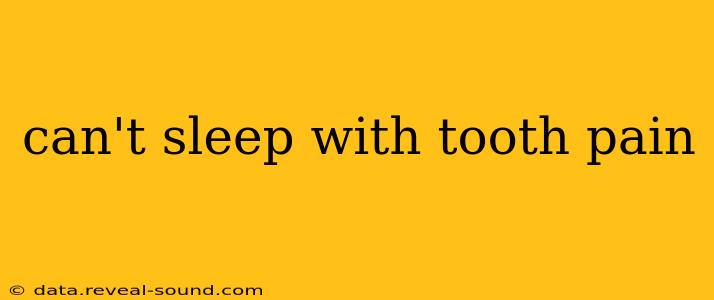Tooth pain is a terrible way to spend the night. That throbbing ache can keep you tossing and turning, leaving you exhausted and irritable the next day. If you're currently battling tooth pain that's preventing you from sleeping, you're not alone. Millions experience this agonizing problem, and thankfully, there are steps you can take to find relief and get some much-needed rest.
What Causes Tooth Pain That Disrupts Sleep?
The causes of tooth pain that interfere with sleep are varied, ranging from relatively minor irritations to serious dental issues. Some common culprits include:
- Cavities: Decayed areas in your teeth can expose the sensitive inner layers, leading to sharp, stabbing pain.
- Abscesses: A bacterial infection at the root of a tooth can cause intense, throbbing pain that often worsens at night.
- Gum disease (gingivitis or periodontitis): Inflammation and infection of the gums can cause pain, swelling, and bleeding.
- Cracked or chipped teeth: Even small fractures can expose the nerves within your teeth, leading to discomfort.
- Teeth grinding (bruxism): This often-unconscious habit can wear down enamel and cause jaw pain, headaches, and tooth sensitivity.
- Sinus infections: Because the sinuses are close to the upper teeth, sinus infections can sometimes cause referred pain that feels like toothache.
- Wisdom teeth issues: Impacted or partially erupted wisdom teeth can cause pain and inflammation.
How Can I Get Relief from Tooth Pain So I Can Sleep?
The best approach is to see a dentist as soon as possible to diagnose and treat the underlying cause. However, while you wait for an appointment, several home remedies can provide temporary relief:
- Over-the-counter pain relievers: Ibuprofen (Advil, Motrin) or naproxen (Aleve) can help reduce pain and inflammation. Always follow the dosage instructions on the label. Acetaminophen (Tylenol) can also help manage pain but doesn't address inflammation.
- Cold compress: Applying a cold compress or ice pack wrapped in a cloth to the affected area can help numb the pain and reduce swelling. Avoid applying ice directly to the skin.
- Saltwater rinse: Gargling with warm salt water can help clean the area and reduce inflammation. Mix 1/2 teaspoon of salt in 8 ounces of warm water.
- Dental floss: Gently flossing around the affected tooth can remove food particles and debris that may be irritating the area. However, avoid flossing if your gums are bleeding excessively.
What if Over-the-Counter Pain Relief Isn't Enough?
If over-the-counter pain relievers don't provide sufficient relief, it's crucial to consult a dentist or emergency dental clinic immediately. Severe tooth pain often indicates a more serious underlying problem that requires professional attention.
Can I Prevent Tooth Pain in the Future?
Preventing tooth pain involves practicing good oral hygiene and regular dental checkups. This includes:
- Brushing twice daily: Use fluoride toothpaste and a soft-bristled toothbrush.
- Flossing daily: This removes food particles and plaque from between your teeth.
- Regular dental checkups and cleanings: Professional cleanings and examinations can help detect and treat problems early.
- Healthy diet: Limit sugary drinks and snacks.
- Mouthguard: If you grind your teeth, a mouthguard can protect your teeth and jaw.
When Should I See a Dentist for Tooth Pain?
Don't delay seeking professional help if you experience:
- Severe or persistent pain: Pain that doesn't respond to home remedies.
- Swelling: Noticeable swelling in your face or gums.
- Fever: A fever often indicates infection.
- Difficulty opening your mouth: This could indicate a serious problem.
- Pus or drainage: This is a sign of infection.
What are Home Remedies for Toothache Pain Relief?
Several home remedies can offer temporary relief from toothache pain, including over-the-counter pain relievers, cold compresses, saltwater rinses, and clove oil (applied carefully to the affected area). Remember these are temporary solutions; professional dental care is essential for lasting relief and treatment of the underlying cause.
How Long Does Toothache Pain Usually Last?
The duration of toothache pain varies significantly depending on the cause and severity. Mild toothaches might subside within a day or two with home remedies, while more serious issues like abscesses require professional treatment and could last much longer. If your pain persists for more than a few days, or if it's severe, see a dentist immediately.
By addressing the root cause of your tooth pain and practicing good oral hygiene, you can significantly reduce your chances of experiencing this disruptive and painful condition again. Getting a good night's sleep is essential for your overall health and well-being, so don't suffer in silence—seek professional help when needed.
